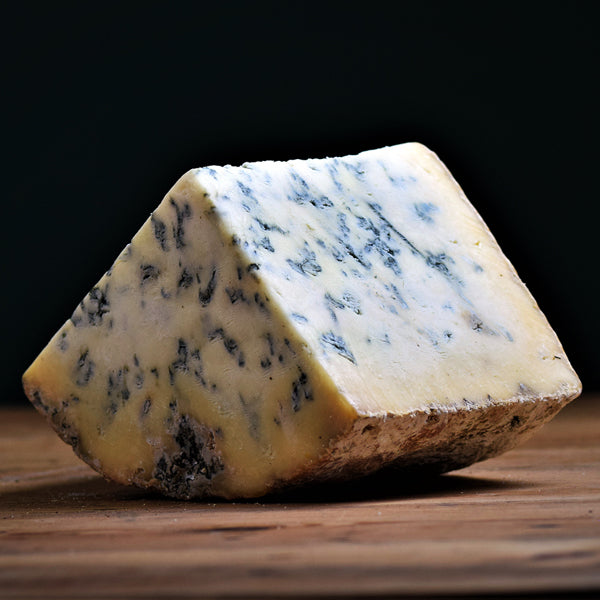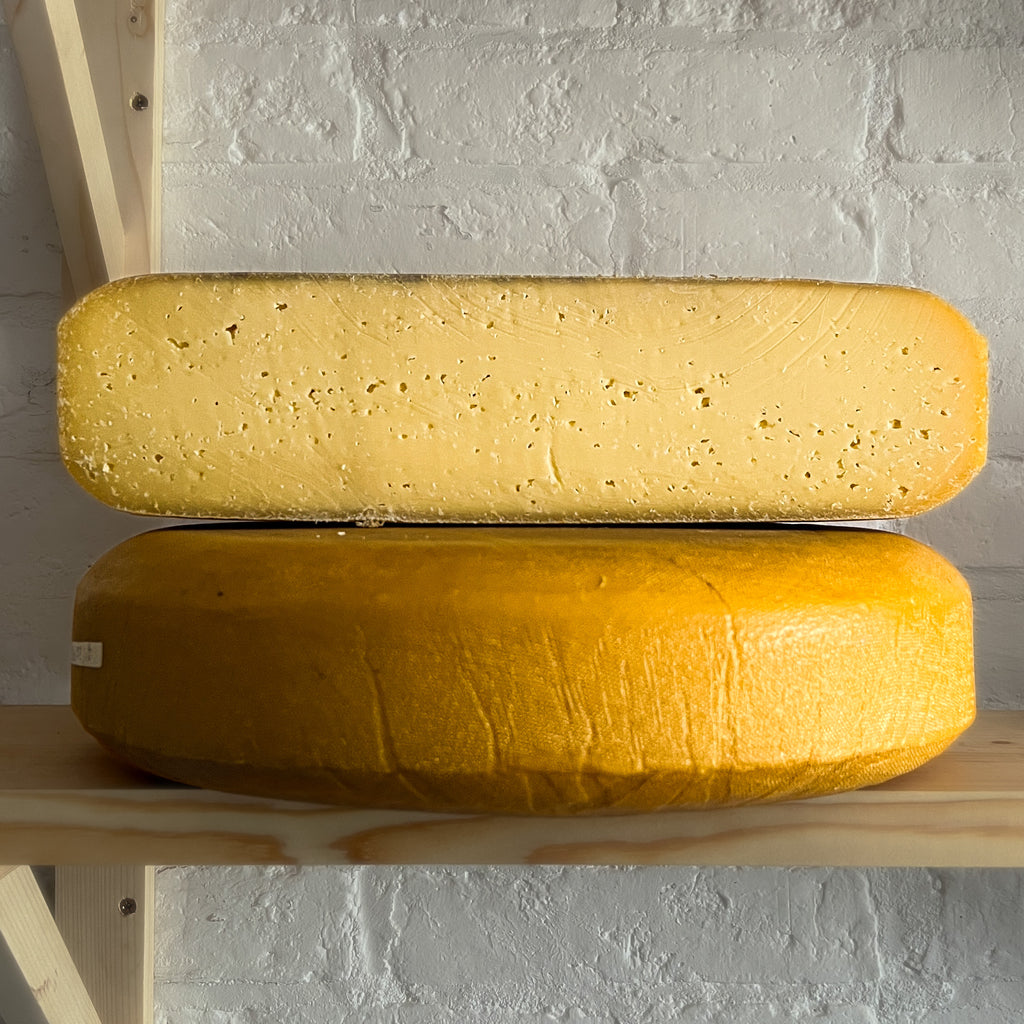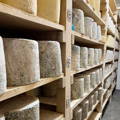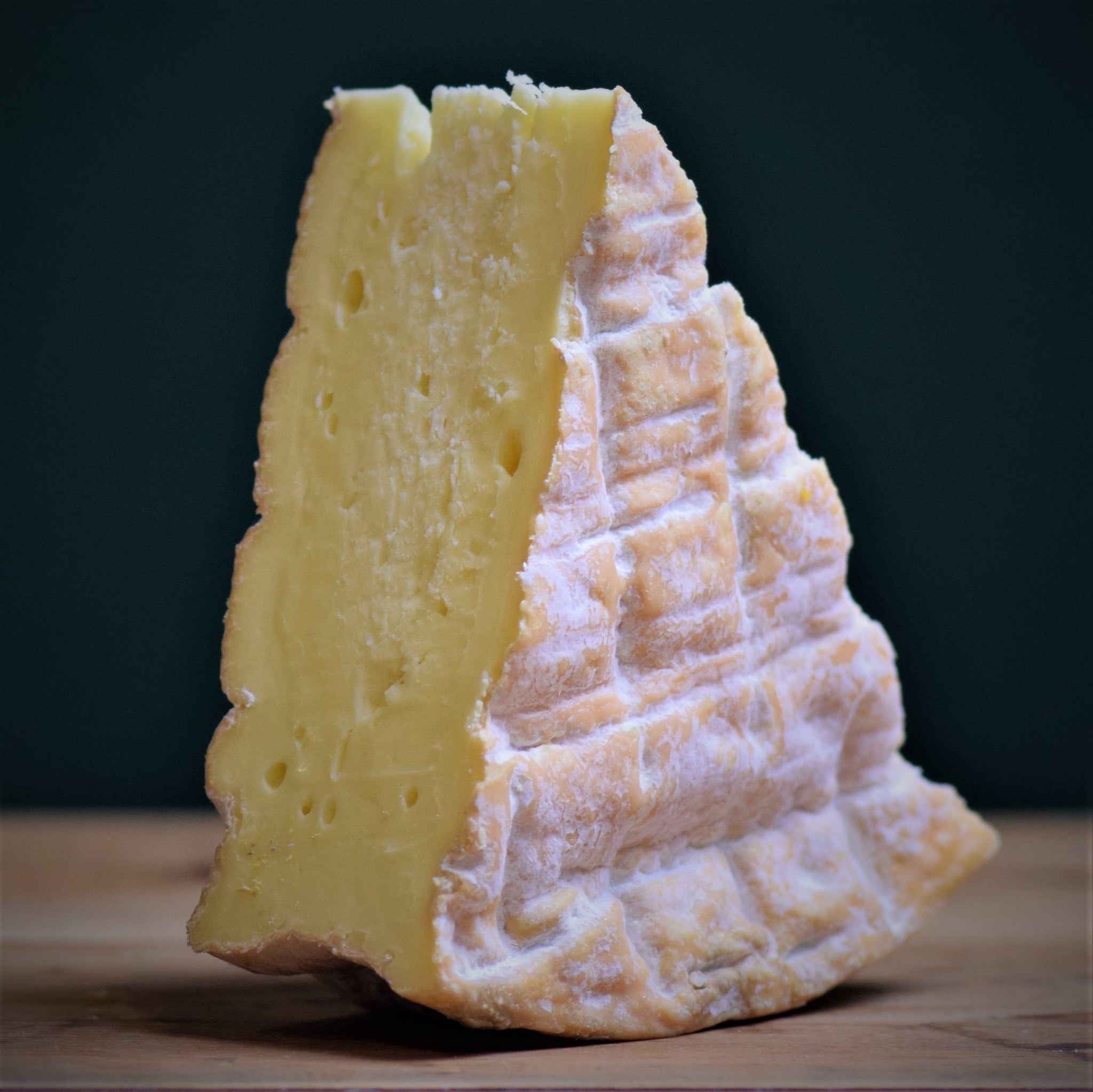Welcome to "The Cheesemaker's Alphabet", where every letter tells a story seasoned with culture, and every entry gives you a slice into the world of artisan cheesemaking. From the artful ageing of affinage to the zestful zing of zinc, this alphabet journey is sure to curdle your notion of ordinary cheese. So, pull up a chair, and let's start at 'A,' where the air is rich with the aroma of artisan craftsmanship.
Affinage
We start at a very apt beginning. Affinage is the practice of ageing cheese under specific conditions to develop flavour and texture. Affinage is an art, often done in specially-made maturing rooms, where the affineur (the person who specialises in affinage) controls the temperature and humidity to ensure the cheese matures in a certain way.
Our CEO, Perry Wakeman, has been voted Affineur of the Year two years in a row and is also the first British affineur to win the award, so Rennet and Rind is home to extraordinary talent.

Blue Cheese
Characterised by its strikingly blue veins against the backdrop of familiar yellow paste examples such as Stilton. Blues are a type of cheese that is inoculated with the mould Penicillium Roquforti, which once the cheese is pierced, manifests in blue or green veins in the cheese.
Browse our blue cheese collection today and add a showstopper to your cheese platter today.
Cheshire Cheese
Cheshire is a region in the North West of England as well as a style of cheese. It’s one of the oldest styles of cheese that is still popular today, as its popularity grew as far back as the 18th century. At Rennet and Rind, we have Appleby’s Cheshire, a strikingly good-looking cheese with an equally stunning taste of lemon, milk and butter fat all in one.
Drying
In cheese-making, drying refers to the process of removing moisture from the cheese curds. This can be done naturally by air drying or with the help of dehumidifiers, but whichever way it’s done, drying is crucial for developing the cheese's texture and rind.
Enzymes
Enzymes in cheesemaking are like skilled artisans, each contributing to transforming simple milk into a myriad of cheese varieties. Enzymes are the catalysts behind these transformations, from coagulating milk into curds to developing unique flavours during the ageing process. They work tirelessly, breaking down proteins, fats, and carbohydrates, which results in the development of the distinct textures and flavours we adore in cheese.
Friable
Friable cheeses have a crumbly texture. This term is often used for cheeses that are dry enough to fall apart easily when handled or cut, such as the delicious Cornish Yarg.

Gouda
Gouda is a popular Dutch cheese known for its rich, creamy taste and smooth texture. Rennet and Rind’s brand-new Connage Gouda is a creamy, nutty and milky cheese that marks the first gouda in our collection.
Hard Cheese
Hard cheeses age longer than the average cheese to achieve a low moisture content, resulting in a firm texture and intense flavour. Browse our hard cheese collection today and find a selection of artisan Cheddars and Red Leicesters today.
Inoculate
Inoculation is the process of adding specific bacteria or moulds to milk during the cheese-making process to produce certain flavours and textures. When these cultures of mould/bacteria ferment, they contribute to the cheese's characteristics, such as the veins and salty flavour of blue cheese.
Junket
In the cheesemaking lexicon, Junket holds a special place with its dual identity. On the one hand, it harkens back to traditional dessert tables, where Junket, a delicacy crafted from sweetened milk curdled with rennet, was a sweet treat enjoyed in times gone by. Meanwhile, in the artisanal craft of cheesemaking, Junket denotes the very essence of creation - the rennet, a critical coagulant that transforms milk into curd. This stage is where the magic begins, setting the stage for the curd to be cut and eventually become the cheese we savour. 'Junket' truly encapsulates the transformative journey from dairy to delicacy.
Kern
Cornish Kern is a type of cheese hailing from Cornwall, known for its sweet aroma, firm texture and moreish almond flavour. In 2017, it was voted the ‘Best Cheese in the World’ at the World Cheese Awards, so other cheeses available on our online store are in esteemed company.
Lancashire
Lancashire is a county in the North West of England, whose cheese is distinct for its creamy and tangy flavour.

Maturing
Also known as ageing, maturing is the process of storing cheese under controlled conditions to develop its flavour and texture. A cheese’s maturing period can vary from a few weeks to several years.
Natural Rind
Natural rind is the outer layer of cheese that naturally develops during the ageing process. Almost like the skin that forms atop custard when leaving it to stand, natural rind is formed from the drying of the surface and the growth of bacteria or moulds.
Oiled
Oiled cheeses have their rinds rubbed with oil to maintain moisture during the ageing process. This can create certain flavours, such as the soft feta-likeGraceburn, which is marinated in oil right up until consumption.
Pasteurisation
Named after Louis Pasteur, who pioneered the technique in the 19th century, pasteurisation involves heating milk to a specific temperature for a set period to destroy harmful bacteria.
Pasteurisation doesn't just protect; it also provides a blank canvas for cheesemakers. By neutralising the milk's natural flora, it allows for the controlled introduction of specific bacteria or enzymes, which are crucial for developing the cheese's desired flavour and texture.
While some cheese purists advocate for the complex flavours of raw milk cheeses, pasteurised cheeses have enabled the cheese industry to flourish, offering a consistent and safe product without significantly diminishing the milk's nutritional value or taste. It's a balancing act between art and science, tradition and innovation.
Quickes Cheddar
Crafted on the Quicke's family farm in Devon, this cheese is a quintessential example of British cheesemaking at its finest.
Quicke's Cheddar is the fruit of generations of dairy artistry, a tradition that dates back centuries. It's a cheese that has evolved with time, embodying the lush pastures of the English countryside. The careful ageing process, which can last up to two years, allows for the development of its rich, complex flavours. Each bite offers a balance of sharpness, nuttiness, and a hint of grassy sweetness, a true homage to the cows' diet of the local flora.

Rennet and Rind
As well as being the name of our store, Rennet and Rind are two separate parts of a cheese. Rennet is an enzyme used to coagulate milk, forming curds and whey, whereas the rind is the outer layer of cheese that forms as it ages.
Starter
A starter is a culture of bacteria that is added to milk to begin the cheese-making process. They ferment lactose into lactic acid, which aids in curdling and developing the cheese's flavour.
Turophile
A name given to a connoisseur or enthusiast of cheese. If you’re browsing our website, it’s highly likely that you’re a turophile!
Upfront Flavour
Upfront flavour refers to the immediate taste you experience as the cheese hits your tastebuds. This can range from a mild flavour such as Mayfield, or a strong upfront flavour like that which can be tasted in Old Roan Wensleydale.
Veins
The veins of cheese are the streaks or layers of mould which develop intentionally to add complexity in flavour and appearance to blue cheese.

Washed Rind
Washed rind cheeses are bathed in a solution such as brine, beer, cider or wine during ageing. This encourages the growth of bacteria that impart a distinctive flavour and a moist, sticky rind. Washed rind cheeses available at Rennet and Rind include the award-winning Rollright and Yarlington.
Xanthophyll
When we leap into the world of Xanthophyll and Beta-Carotene, we land in the vibrant realm of cheese hues. These compounds are the unsung heroes behind the golden glow of your favourite cheddar or the pale creaminess of a fresh goat's cheese.
Cows - those gentle grazers - are relatively inefficient at absorbing these pigments, allowing the Beta-Carotene to pass through into their milk and, consequently, into the cheese, giving it a natural yellow tint. This is especially true for cows that feed on rich, green grass. On the other hand, goats are more adept at metabolising these compounds, which is why their milk—and the resulting cheese—tends to have a whiter appearance.
Yeast
Yeast plays a pivotal role in the development of flavours and textures in cheese. One fascinating aspect of yeast in cheesemaking is its contribution to the development of Geotrichum rinds.
Geotrichum, a type of yeast, is responsible for the distinct, wrinkly rinds found on many artisan cheeses. These rinds aren't just about aesthetics; they're crucial in developing a cheese's character and flavour profile. Geotrichum yeast works by breaking down fats and proteins in the cheese, leading to softer textures and complex flavours. The rind that develops as a result of this yeast's activity is often thin and delicate, contributing to the overall sensory experience of the cheese.
But there's more to Geotrichum than meets the eye. It's a bit of a balancing act; cheesemakers must carefully manage their growth to ensure the right texture and flavour development. Too little, and the cheese might lack complexity; too much, and the cheese could become overly runny or develop off-flavours.
You can find yeast in the award-winner for Britain’s Best Cheese at this year’s World Cheese Awards, Sinodun Hill, as well as Driftwood and some ripened batches of Baron Bigod.
Zinc
Finally, zinc is an essential mineral that is present in milk and, consequently, in cheese. It’s one of the many good minerals found in cheese.
